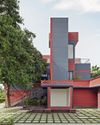
The project is the redevelopment of a slum comprising 33 homes built in the first phase and 265 homes expected to begin later this year. It is a public/private partnership that is partly funded by the Indian government through its Housing for All (PMAY- Urban) program. AMC and the US-based Curry Stone Foundation also contributed funds, along with the residents themselves. Additional funding is being raised through philanthropic donations.
The team’s mission is to deliver safe and healthy homes, jobs and training, community enrichment programs, and further female homeownership, in order to co-create a vibrant and thriving community with the residents. Current thinking on low-income housing tends to prioritize the quantity of units, resulting in impersonal high-rise structures that degrade rather than supporting the communities they seek to serve. The architects believe that addressing housing inequality is more than building individual units. It is about building communities; creating a balance of safe, healthy private and communal spaces that enhance inherent social bonds and enable human flourishing. The residents of Sanjaynagar have contributed to design decisions at all scales, from the neighbourhood level to the customizations in their individual homes. The 298 dwelling units are organized into 8 G+2 buildings. To enhance the social infrastructure of the slum, the buildings are organized around eight courtyards of varying sizes. When completed, Sanjaynagar will be a fully functional neighbourhood with all essential amenities including water, drainage, roads, street lighting, childcare and community centers, courtyards for healthy recreation, and edible rooftop gardens. At the end of the project, it will no longer be a slum.
This story is from the June 2022 edition of Architecture + Design.
Start your 7-day Magzter GOLD free trial to access thousands of curated premium stories, and 9,000+ magazines and newspapers.
Already a subscriber ? Sign In
This story is from the June 2022 edition of Architecture + Design.
Start your 7-day Magzter GOLD free trial to access thousands of curated premium stories, and 9,000+ magazines and newspapers.
Already a subscriber? Sign In

A GRECIAN RETREAT
Shimona Bhansali imbues a subtle touch of opulence to this home in Mumbai

A BOLD STATEMENT
Dhampur Sugar Mills Limited's workspace in New Delhi designed and built by Officebanao adopts an industrial narrative

A BREATH OF FRAGRANT DESIGN IN DELHI'S HEART
An office that smells like perfumery; that is the vision that TWI brought to life in this office space designed for an acclaimed perfume company in India

MASTER OF ALL TRADES
The ethos of forward-thinking and ingenuity finds its architectural counterpart within the walls of Nikhil Kamath and Abhijeet Pai's office-a vision of organic design infused with the essence of India

A TOUCH OF OPULENCE
Designed by Aparna Kaushik, this Delhi office displays an interesting balance of classic aesthetics and contemporary sensibilities

THE WOODEN WONDERLAND
Priyanka and Piyush Mehra envision a stunning experience centre for Vikas Plywood

THE HUB: BUILDING COMMUNITIES
Studio Lotus designs a dynamic mixed-use community hub that activates Chennai's largest IT Park

THE WINNER'S PERCH
Baldiwala Edge designs a Singapore-based ship broker's office as a torch collector's paradise, offering a 360-degree bird's-eye view of the Mumbai skyline

THE DIRECTOR'S CABIN
Designed by Envisage, this office gives a new definition to the traditional notion of biophilia

Designing Corporate India
From weaving the magic of a Star Trek-themed command centre to crafting bespoke block-printed workstations, Vijaya Bhargav and Arnab Ghosh-the trailblazing co-founders of Ostraca-have astonishingly transformed a staggering 29 million square feet of office space for India's tech giants and global enterprises-all while maintaining a flat hierarchical company culture-fuelling a master class in corporate design